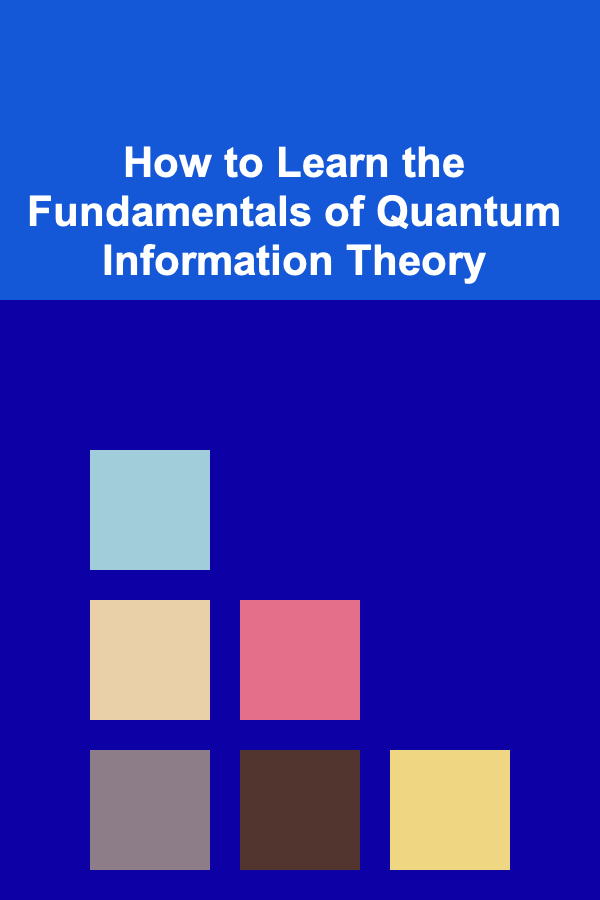
How to Learn the Fundamentals of Quantum Information Theory
ebook include PDF & Audio bundle (Micro Guide)
$12.99$8.99
Limited Time Offer! Order within the next:

Quantum Information Theory is a rapidly evolving field at the intersection of quantum mechanics and information theory. It explores the unique properties of quantum systems that can be harnessed to process and transmit information in ways that classical systems cannot. From quantum computing to quantum cryptography and quantum communication, the field of Quantum Information Theory offers groundbreaking potential for revolutionizing technology. However, it is also a highly abstract and mathematically complex area of study.
In this article, we will explore the core principles of Quantum Information Theory, the fundamental concepts that underpin the field, and how you can learn and master these concepts. The goal is to provide a structured approach for students, professionals, or curious minds who want to dive into the subject with a clear understanding of where to start and how to progress.
What Is Quantum Information Theory?
Quantum Information Theory combines ideas from quantum mechanics and classical information theory to understand and manipulate information in quantum systems. In classical information theory, information is encoded in bits, which can be either 0 or 1. In contrast, in quantum systems, information is encoded in quantum bits, or qubits , which can exist in multiple states simultaneously due to a phenomenon called superposition.
Moreover, quantum systems exhibit entanglement, a phenomenon where the state of one particle is instantaneously related to the state of another, no matter how far apart they are. These and other quantum phenomena open up possibilities for information processing and transmission that are simply not achievable with classical systems.
Key Concepts in Quantum Information Theory
- Qubits and Superposition: A qubit is the quantum version of a classical bit. Unlike classical bits, which are either 0 or 1, qubits can be in a superposition of both states. This means that a qubit can represent multiple possibilities simultaneously, vastly expanding the computational power of quantum systems.
- Entanglement: When two or more qubits are entangled, the state of one qubit becomes directly related to the state of the other, regardless of the distance between them. This phenomenon has profound implications for quantum computing and cryptography.
- Quantum Gates and Circuits: Quantum gates manipulate qubits in quantum computing. These gates work similarly to classical logic gates but exploit quantum mechanical properties like superposition and entanglement to perform operations on qubits.
- Quantum Teleportation: Quantum teleportation is a technique by which quantum information can be transferred between distant locations without physically transmitting the particles themselves. It relies on quantum entanglement and superdense coding.
- Quantum Cryptography : One of the most promising applications of Quantum Information Theory is quantum cryptography, which offers theoretically unbreakable encryption through the principles of quantum mechanics. The most famous example is quantum key distribution (QKD), particularly the BB84 protocol, which ensures that any eavesdropping attempt on quantum communication is detectable.
- Quantum Error Correction: Quantum systems are highly susceptible to errors due to noise and decoherence. Quantum error correction codes are designed to detect and correct errors that occur during quantum computation or communication, ensuring the reliability of quantum information processing.
- Shannon Entropy vs. von Neumann Entropy : In classical information theory, Shannon entropy measures the uncertainty of a random variable. In quantum information theory, the von Neumann entropy serves as the quantum analog, providing a measure of the uncertainty or disorder in a quantum state.
How to Start Learning Quantum Information Theory
Quantum Information Theory can seem daunting at first, but breaking down the learning process into manageable steps can make it more approachable. Here are some guidelines on how to begin:
1. Get Comfortable with Prerequisites
Before diving into Quantum Information Theory, you need to have a solid foundation in several key areas of mathematics and physics. These include:
Mathematics
- Linear Algebra: Quantum mechanics and Quantum Information Theory heavily rely on linear algebra. You'll need to understand vector spaces, inner products, eigenvalues, eigenvectors, and matrix operations.
- Probability Theory: Quantum mechanics is inherently probabilistic, and you'll need to grasp probability theory to understand concepts like measurement, state collapse, and the probabilistic nature of quantum systems.
- Complex Numbers: Quantum states are often represented as complex vectors, so familiarity with complex numbers, including their conjugates and magnitudes, is essential.
- Group Theory: Understanding group theory can be useful, especially when dealing with symmetry operations in quantum systems.
Physics
- Quantum Mechanics: A basic understanding of quantum mechanics is necessary. This includes concepts such as wave-particle duality, uncertainty principle, wave functions, and quantum superposition.
- Classical Information Theory: While Quantum Information Theory builds on quantum mechanics, it also relies on classical information theory, including concepts like entropy, communication channels, and error correction.
2. Start with the Basics of Quantum Mechanics
Quantum Information Theory builds on the foundation of quantum mechanics, so it's important to first understand the basic principles of quantum theory. Begin with the following topics:
- Wave functions and Schrödinger's equation: Understanding the mathematical representation of quantum systems is fundamental.
- Superposition principle: Learn how particles can exist in multiple states at once and how this relates to qubits.
- Entanglement: Study the concept of entanglement, which is a cornerstone of Quantum Information Theory.
Some useful resources for learning quantum mechanics include:
- Books: "Introduction to Quantum Mechanics" by David J. Griffiths
- Online Courses: MIT OpenCourseWare offers free courses on quantum mechanics.
- Lectures: Watch introductory lectures on YouTube or academic platforms like edX and Coursera.
3. Learn Classical Information Theory
Classical information theory provides the foundation for understanding information processing and transmission. Key concepts to learn include:
- Shannon's Information Theory: This includes understanding bits, entropy, and the capacity of communication channels.
- Error Correction: Study classical error correction codes and how they are used in communication systems.
A good starting point for classical information theory is:
- Books: "Elements of Information Theory" by Thomas M. Cover and Joy A. Thomas
- Online Resources: Look for free resources and lectures online from institutions like Stanford or UC Berkeley.
4. Dive into Quantum Information Theory
Once you're comfortable with quantum mechanics and classical information theory, you can start studying the specific topics of Quantum Information Theory. Here are the key areas to focus on:
Qubits and Quantum States
Learn how qubits are represented using state vectors and density matrices. Understand the Bloch sphere representation and the significance of quantum superposition.
Quantum Gates and Circuits
Study how quantum gates (such as the Pauli gates, Hadamard gate, and CNOT gate) manipulate qubits and form quantum circuits. Learn about quantum algorithms like Grover's search algorithm and Shor's factoring algorithm.
Entanglement and Teleportation
Explore how entanglement is used to create correlations between qubits. Learn about quantum teleportation and its potential for quantum communication.
Quantum Cryptography
Study quantum key distribution protocols like BB84 and how quantum mechanics can secure communication in ways classical systems cannot.
Quantum Error Correction
Explore the strategies for detecting and correcting errors in quantum systems, including the Shor code and the surface code.
5. Work on Practical Quantum Computing
Once you've grasped the theoretical concepts, you can start exploring practical quantum computing. Several platforms offer access to quantum computers and simulators, allowing you to experiment with real quantum circuits:
- IBM Quantum: IBM offers free access to their quantum computers through the IBM Quantum Experience platform.
- Microsoft Quantum Development Kit: Microsoft's Q# programming language is designed for quantum programming.
- Google Cirq: Google's open-source framework for quantum computing.
6. Join a Quantum Community
The field of Quantum Information Theory is rapidly evolving, and staying updated with the latest developments is essential. Consider joining a community of quantum enthusiasts, researchers, and professionals to stay informed and share ideas. Some ways to do this include:
- Conferences and Workshops: Attend conferences like QIP (Quantum Information Processing) and ICQI (International Conference on Quantum Information).
- Online Forums: Engage in online communities like the Quantum Computing StackExchange, Reddit's quantum computing community, and other online forums.
- Research Papers : Read academic papers from journals like Nature Physics , Physical Review Letters , and Quantum to keep up with the latest research in the field.
7. Stay Persistent and Practice
Learning Quantum Information Theory is challenging, but persistence and consistent practice will lead to mastery. Work on small projects, solve problems, and continue building your knowledge and understanding over time.
Conclusion
Quantum Information Theory is an exciting and complex field that has the potential to revolutionize computing, cryptography, and communication. By building a strong foundation in quantum mechanics, classical information theory, and the mathematical tools required to understand quantum systems, anyone can begin learning this fascinating subject. While the learning curve may be steep, with the right resources and a dedicated approach, it is possible to master the fundamentals of Quantum Information Theory and contribute to this cutting-edge field.
Whether you're a student just beginning to explore the world of quantum mechanics or a professional looking to expand your knowledge, the key is to take it step by step. Understand the basic principles, learn the theory, and experiment with practical applications. With the proper guidance and a passion for learning, you'll be well on your way to mastering Quantum Information Theory.

How to Build Wealth with Small-Cap Stock Investments
Read More
How to Create Engaging Website Content: A Checklist for Compelling Copywriting
Read More
How to Tackle Dusting in Every Room of Your Home
Read More
How to Track Your Expenses Without Feeling Overwhelmed
Read More
Encouraging Healthy Eating Habits in Picky Eaters: A Comprehensive Guide
Read More
How to Secure Funding for Your Sculptural Installation Project
Read MoreOther Products

How to Build Wealth with Small-Cap Stock Investments
Read More
How to Create Engaging Website Content: A Checklist for Compelling Copywriting
Read More
How to Tackle Dusting in Every Room of Your Home
Read More
How to Track Your Expenses Without Feeling Overwhelmed
Read More
Encouraging Healthy Eating Habits in Picky Eaters: A Comprehensive Guide
Read More